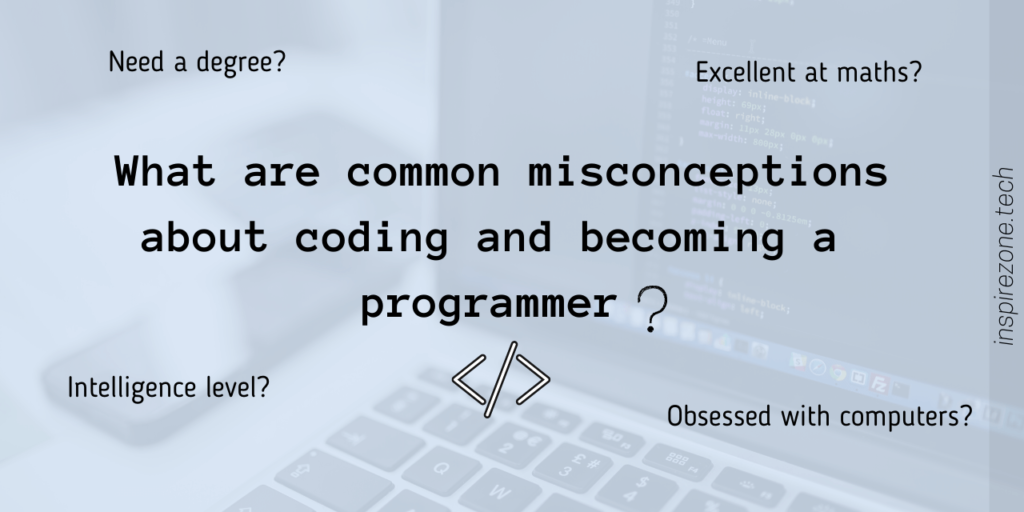
When you think of a programmer, who do you imagine?
Do you imagine someone like Bill Gates, founder of Microsoft, who is seen to be a genius who revolutionised the software industry? Or do you imagine other tech pioneers like Steve Jobs, founder of Apple or Mark Zuckerberg, founder of Facebook?
Because of this do you believe programmers are people with above-average levels of intelligence and skills?
However, don’t get caught up with any misconceptions about coding you may have heard about and convinced yourself are real.
Believing in common misconceptions about coding can discourage someone from considering software engineering as a potential fit for them. Debunking these misconceptions is necessary to show that coding is approachable for anyone willing to learn.
There are several misconceptions about coding that simply hold no weight nowadays that we see all sorts of people from different backgrounds, personalities and skills involved in software development.
Let’s discuss some of the common misconceptions about coding and provide counter arguments for each of these misconceptions.
Misconception #1: Coding is for ‘intelligent’ people

A common misconception about coding is that it’s only for people who are deemed to be ‘geniuses’ and have above-average levels of intelligence. However, these misconceptions about coding are probably generated by the stereotypes of a ‘tech genius’ that runs a hugely successful organisation (e.g. Bill Gates).
However, coding is not just about intelligence and rather, your attitude to learning and problem solving is what counts.
Counter Argument: Your willingness to learn is more important than any level of intelligence
Are you passionate about learning? If you answered yes that makes you qualified enough to try out coding. A willingness to learn new skills and push yourself when there are obstacles is far more important than any measure of intelligence.
Coding is not just about writing code. At the core of coding is learning, problem-solving and persistence. It’s about continuously learning new skills and technologies and also learning from your mistakes. You’ll be constantly faced with challenges that sometimes require intense levels of effort and concentration to solve.
Coding is a skill worth pursuing for anyone with a willingness to learn.
Counter Argument: Intelligence can’t be defined objectively anyway
What determines how intelligent someone is anyway?
There are various theories on how intelligence can be measured such as the IQ test. However, while IQ is seen as a popular method of measuring intelligence, there are all sorts of doubts on the accuracy of IQ because of how bias and interpretation can influence an IQ score.
Like all industries, there are people of varying IQ, EQ or whatever you want to use to try and determine someone’s intelligence. The same applies to the software field, you’ll come across people of all types that are all solving problems through coding.
So, if we can’t accurately define or measure intelligence, what does being intelligent have to do with knowing how to code or working as a programmer? Don’t worry about indicators like intelligence and instead focus on using your own strengths to enable you to solve problems through coding.
Related: Why you don’t need a good memory to code effectively.
Misconception #2: Coding requires excellent mathematical skills

Maths by itself is an important subject for everyone and the ability to perform basic maths is essential for several aspects of our lives.
There are some fields that require higher levels of maths and programming is often cited as a field requiring excellent maths skills.
Rather than being caught up about your maths skills, think of these counter-arguments instead:
Counter Argument: Think patterns and algorithms rather than pure maths
Another way to explain coding is a means of solving problems through the use of algorithms. These algorithms are communicated by humans and instructs machines on how to perform tasks in a way that is efficient and practical for the application.
For this reason, the ability to break down problems, formulate patterns and tackle them through the creation of algorithms is a core of what it takes to code. This is why when teaching kids to code there is an importance placed on understanding the process of algorithm development and not necessarily on maths skills.
While having a mathematical mindset may improve one’s ability to develop problem-solving skills, anyone with a capacity to understand the concept of patterns and algorithms is well capable of learning to code.
Counter Argument: Supportive tools and resources negate the need for maths in most cases
Making good use of appropriate tools and resources takes away the requirement to possess advanced maths skills to code.
Just like how we have a calculator that removes the need to perform calculations in our head, there are tons of tools that replace the need to become deeply involved in maths.
However, it’s important to acknowledge there are tons of mathematical aspects to coding and some fields of software engineering like data science and analytics will require more involvement with maths.
Whether you’re deeply involved in maths or not, handling of several mathematical concepts and formulas are made easier by the utilities, tools, libraries, frameworks and other resources that provide ready-made paths to avoid getting too deeply involved in the mathematical side.
So while being comfortable with maths helps, it’s not an absolute requirement to become a proficient programmer.
Misconception #3: You need a relevant university degree to be successful in the industry

Some may be put off by thinking they need a computer science degree or equivalent to become successful in the field of programming.
However, these common misconceptions can be debunked quite easily with countless examples of people who are self-taught programmers blending in with those who have a relevant degree.
Counter Argument: Many programmers have degrees in a field unrelated to software engineering
We’ve discussed how coding is all about having an interest in problem-solving. Anyone with this interest can develop the necessary skills required to code and does not have to be learned through formal education.
Of course, going through a degree in computer science or similar will be beneficial in terms of providing a structured learning method and equipping you with fundamental and practical knowledge. At the end of any formal education, you’ll also receive a degree proving you’ve gone through the relevant curriculum and this will be advantageous in representing your competencies in the field.
However, any other professional path that needs problem-solving and analytical skills (which many do) will also be useful to anyone wanting to pick up coding.
Accountants, lawyers, photographers, doctors, chefs, the unemployed… anyone can pick up coding without needing a relevant software engineering degree as long as they are willing to learn and grow their critical thinking skills.
Counter Argument: Many successful programmers don’t have degrees at all!
Taking Bill Gates again as an example, he is one of several well-known successful entrepreneurs that used technology to their advantage but did not officially obtain a degree before setting up their companies.
Even though I only have a high-school degree, I’m a professional student. – Bill Gates.
Steve Jobs and Mark Zuckerberg are also well-known entrepreneurs that took similar paths of actually dropping out of college before setting up their businesses.
While these are extreme examples and rare cases, it highlights how people without an official college degree can still end up revolutionising the software engineering field. So I think it’s safe to say having an official college degree is not a requirement to be successful as a programmer!
Misconception #4: Coding is boring

If you’re not involved in the software industry you may see coding as sitting at a desk all day being intensely focused on your work.
However, coding involves other activities than just simply writing code. There’s planning, designing, debugging, analysing and tons of other activities that go into the development of functioning applications.
Furthermore, at a bigger picture, think of what coding enables us to do. Coding is literally at the core of what allows the continuous and rapid advancement of technology.
Counter Argument: All technology is powered by code, what is more exciting than that?
Through coding, you have the ability to contribute to technologies that transform the way we live and our quality of life.
Technology is also at the heart of most businesses as a growing number of industries now rely on having some sort of technology department. Whether it’s a business providing software services directly or making use of one, organisations of today must pay attention to how technology can be used to grow their products and services.
As individuals, the lives of consumers are constantly being transformed through the various gadgets and systems we interact with every day which are powered by software.
Not to mention all aspects of our global infrastructure and services all have components powered by software engineering such as energy, education, agriculture, health, finance, entertainment, transport and much more.
Knowing you have the ability to contribute to the evolution of society through code should be exciting enough by itself!
Related: 11 Interesting examples of Embedded Systems in daily life.
Counter Argument: Coding is problem-solving and problem-solving is fun
Admittedly this will depend on the personality of the individual. However, there’s a level of satisfaction that comes from solving problems which coding is all about.
The misconceptions about coding that it’s boring may come from being oblivious to the various activities involved with coding or if you happen to be someone who doesn’t find any satisfaction from problem-solving.
However, if you’re someone that enjoys tackling problems and solving them, then coding is worth pursuing.
Misconception #5: Programmers live and breathe code

Another common misconception is that programmers typically code every waking hour and are always in touch with the tech world and constantly upskilling even outside of their typical working hours.
However, the more programmers you know the more you’ll realise these misconceptions about coding are just not the case.
Counter Argument: Programmers like everyone else, have other interests outside of coding
The requirement to have some kind of obsession with coding as a programmer likely comes from a common expectation that coders should always be working on projects on the side.
While it’s a valid point that having side projects can make someone stand out in terms of job prospects, it’s not necessary to always be working on projects on the side or to even have a side project at all.
Programmers like anyone else can have multiple interests and passions. There are programmers who also have other hobbies whether reading, writing, cooking, travelling, volunteering, or just simply using their free time to spend with family and friends.
Counter Argument: It’s okay to view programming as just a job
Like in other career paths most people keep work to their working hours and do other things outside of work.
Working as a software engineer is just the same. Most people will code only at their job and go home to do other things. So if you get a development job you won’t be expected to code all day and every day (at least I hope this is not the case!).
There are of course some people who do live and breathe code (figuratively speaking) but this is nowhere near the majority. Most people in the field are doing it make a living then go home to do other things, and there’s nothing wrong with that!
Conclusion
We covered some misconceptions about coding that may discourage individuals from picking up coding. The counter arguments offered in this article highlights why these misconceptions about coding are simply myths with no real substance for their claims.
As mentioned throughout this article, the main requirement for coding is your willingness and determination to learn new skills and to grow your ability to problem-solve.
If this sounds like something you’ll enjoy, why not explore the possibility of learning to code?
If you’re still not convinced here’s another article from us that explains the importance of learning to code for anyone, whether you want to do it professionally or not: 3 Incredible benefits of coding beyond technical skills (why everyone should learn to code)
What other common misconceptions about coding have you heard about that we didn’t cover? Let us know in the comments!
See other articles you may be interested in below: